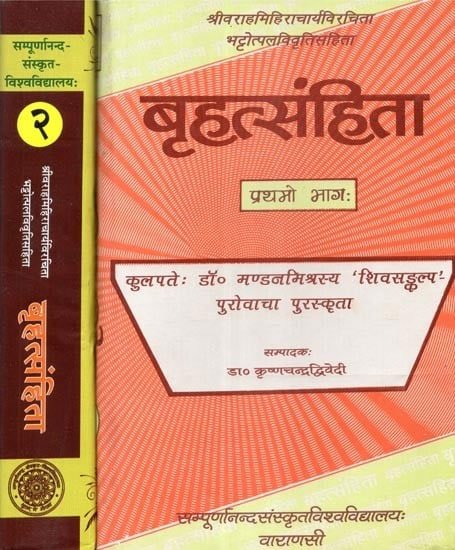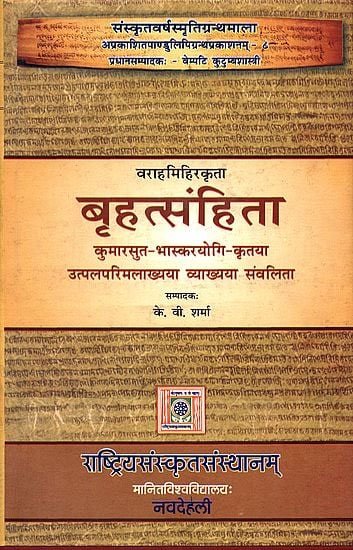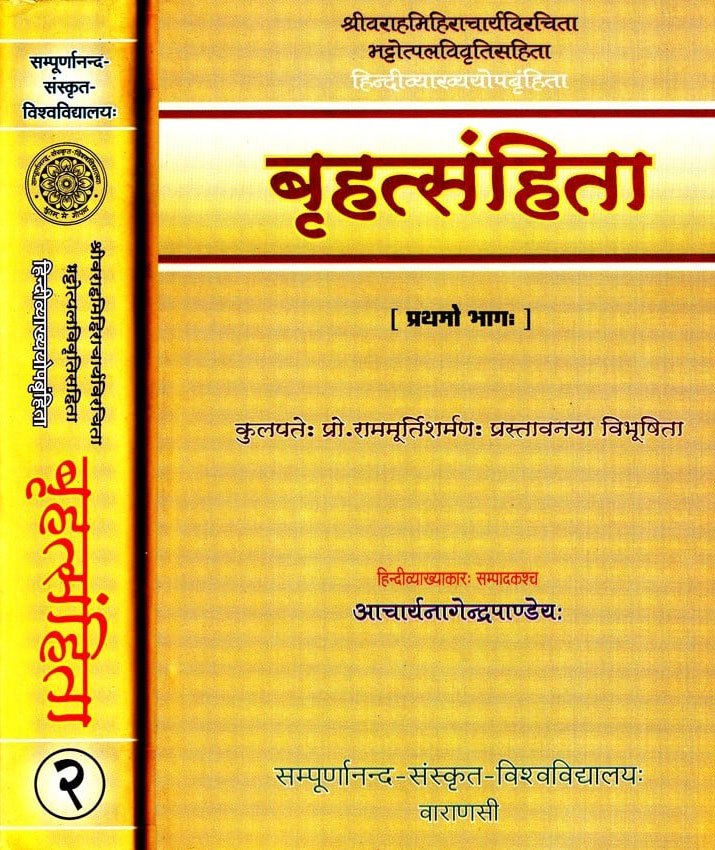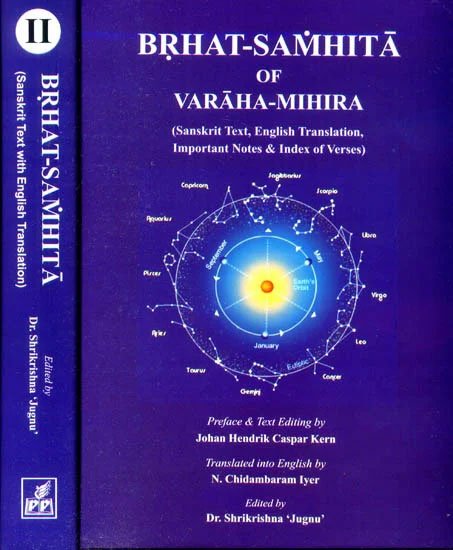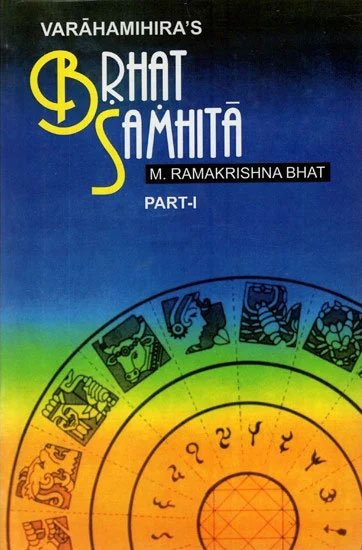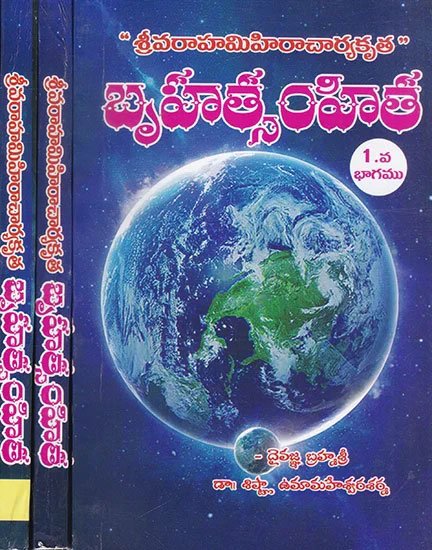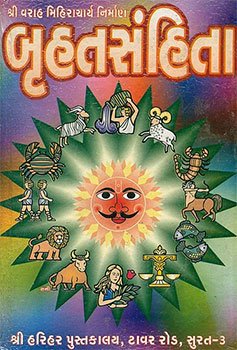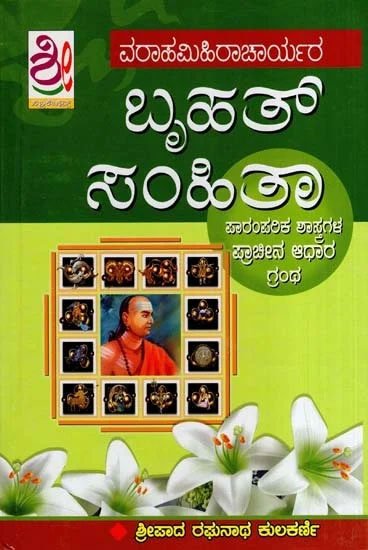Brihat-samhita [sanskrit]
26,560 words
The Sanskrit text of the Brihat-samhita from the 6th-century authored by Varaha Mihira in present-day Ujjain, India. It primarily deals with astrology and astronomy but is presented as an encyclopedia of knowledge.
Verse 42.59
अविरतजनरावं मङ्गलाशीः प्रणामैः पटुपटहमृदङ्गैः शङ्खभेर्यादिभिश्च ।
श्रुतिविहितवचोभिः पापठद्भिश्च विप्रैरशुभविहतशब्दं केतुमुत्थापयेच्च ॥ ५९ ॥
[रहित । उत्थापयीत]
aviratajanarāvaṃ maṅgalāśīḥ praṇāmaiḥ paṭupaṭahamṛdaṅgaiḥ śaṅkhabheryādibhiśca |
śrutivihitavacobhiḥ pāpaṭhadbhiśca viprairaśubhavihataśabdaṃ ketumutthāpayecca || 59 ||
[rahita | utthāpayīta]
The Sanskrit text of Verse 42.59 is contained in the book Brihata Samhita (Sanskrit Text with Hindi Translation) by Pandit Achyutananda Jha. This book is available online or you could buy the latest edition:
Read online Buy now! The Sanskrit text by Pandit Achyutananda Jha (2001)
Glossary of Sanskrit terms
Note: This extracts Sanskrit terms and links to English definitions from the glossary, based on an experimental segmentation of verse (42.59). Some terms could be superfluous while some might not be mentioned. Click on the word to show English definitions.
Avirata, Jana, Rava, Mangala, Ashi, Ashir, Ashis, Pranama, Patu, Pataha, Shankha, Bheri, Adi, Adin, Shrut, Shrutin, Shruti, Vihita, Vacas, Papathat, Vipra, Ashubha, Vihata, Shabda, Ketu, Uttha, Rahita,
Analysis of Sanskrit grammar
Note: this is an experimental feature and only shows the first possible analysis of the Sanskrit text (Verse 42.59). If the system was successful in segmenting the sentence, you will see of which words it is made up of, generally consisting of Nouns, Pronouns, Verbs, Participles and Indeclinables. Click on the link to show all possible derivations of the word.
- Line 1: “aviratajanarāvaṃ maṅgalāśīḥ praṇāmaiḥ paṭupaṭahamṛdaṅgaiḥ śaṅkhabheryādibhiśca ”
- avirata -
-
avirata (noun, masculine)[compound], [vocative single]avirata (noun, neuter)[compound], [vocative single]
- jana -
-
jana (noun, masculine)[compound], [vocative single]jana (noun, neuter)[compound], [vocative single]√jan (verb class 1)[imperative active second single]
- rāvam -
-
rāvan (noun, masculine)[adverb]rāvan (noun, neuter)[adverb]rāva (noun, masculine)[adverb], [accusative single]
- maṅgalā -
-
maṅgala (noun, masculine)[compound], [vocative single]maṅgala (noun, neuter)[compound], [vocative single]maṅgalā (noun, feminine)[nominative single]
- āśīḥ -
-
āśi (noun, feminine)[accusative plural]āśī (noun, feminine)[accusative plural]āśir (noun, feminine)[nominative single], [vocative single]āśis (noun, feminine)[nominative single], [vocative single]
- praṇāmaiḥ -
-
praṇāma (noun, masculine)[instrumental plural]
- paṭu -
-
paṭu (noun, masculine)[compound], [adverb]paṭu (noun, neuter)[compound], [adverb], [nominative single], [vocative single], [accusative single]paṭū (noun, feminine)[adverb], [vocative single]
- paṭaham -
-
paṭaha (noun, masculine)[adverb], [accusative single]
- ṛ -
-
ṛ (noun, feminine)[compound], [adverb]ṛ (noun, masculine)[compound], [adverb]
- daṅ -
-
dā (noun, feminine)[adverb]dā (noun, masculine)[adverb]
- gaiḥ -
-
ga (noun, masculine)[instrumental plural]ga (noun, neuter)[instrumental plural]
- śaṅkha -
-
śaṅkha (noun, masculine)[compound], [vocative single]śaṅkha (noun, neuter)[compound], [vocative single]
- bheryā -
-
bherī (noun, feminine)[compound], [adverb], [nominative single], [vocative single], [instrumental single]
- ādibhiś -
-
ādi (noun, masculine)[instrumental plural]ādi (noun, neuter)[instrumental plural]ādi (noun, feminine)[instrumental plural]ādin (noun, masculine)[instrumental plural]ādin (noun, neuter)[instrumental plural]
- ca -
-
ca (indeclinable conjunction)[indeclinable conjunction]ca (noun, masculine)[compound], [vocative single]ca (noun, neuter)[compound], [vocative single]
- Line 2: “śrutivihitavacobhiḥ pāpaṭhadbhiśca viprairaśubhavihataśabdaṃ ketumutthāpayecca || 59 |”
- śruti -
-
śruti (noun, feminine)[compound], [adverb]śrutin (noun, masculine)[compound], [adverb]śrutin (noun, neuter)[compound], [adverb], [nominative single], [vocative single], [accusative single]śrutī (noun, masculine)[adverb], [vocative single]śrutī (noun, feminine)[compound], [adverb], [vocative single]śrutī (noun, neuter)[compound], [adverb], [nominative single], [vocative single], [accusative single]śrut (noun, feminine)[locative single]śrut (noun, masculine)[locative single]śrut (noun, neuter)[locative single]
- vihita -
-
vihita (noun, masculine)[compound], [vocative single]vihita (noun, neuter)[compound], [vocative single]
- vacobhiḥ -
-
vacas (noun, masculine)[instrumental plural]vacas (noun, neuter)[instrumental plural]
- pāpaṭhadbhiś -
-
√paṭh -> pāpaṭhat (participle, masculine)[instrumental plural from √paṭh]√paṭh -> pāpaṭhat (participle, neuter)[instrumental plural from √paṭh]
- ca -
-
ca (indeclinable conjunction)[indeclinable conjunction]ca (noun, masculine)[compound], [vocative single]ca (noun, neuter)[compound], [vocative single]
- viprair -
-
vipra (noun, masculine)[instrumental plural]vipra (noun, neuter)[instrumental plural]
- aśubha -
-
aśubha (noun, masculine)[compound], [vocative single]aśubha (noun, neuter)[compound], [vocative single]
- vihata -
-
vihata (noun, masculine)[compound], [vocative single]vihata (noun, neuter)[compound], [vocative single]
- śabdam -
-
śabda (noun, masculine)[adverb], [accusative single]
- ketum -
-
√ki -> ketum (infinitive)[infinitive from √ki]ketu (noun, masculine)[accusative single]
- utthā -
-
uttha (noun, masculine)[compound], [vocative single]uttha (noun, neuter)[compound], [vocative single]utthā (noun, feminine)[nominative single]
- āpayec -
-
√āp (verb class 0)[optative active third single]√i (verb class 0)[optative active third single]
- ca* -
-
- Cannot analyse 59
- Line 3: “[rahita ”
- rahita -
-
rahita (noun, masculine)[compound], [vocative single]rahita (noun, neuter)[compound], [vocative single]√rah -> rahita (participle, masculine)[vocative single from √rah class 1 verb], [vocative single from √rah class 10 verb]√rah -> rahita (participle, neuter)[vocative single from √rah class 1 verb], [vocative single from √rah class 10 verb]
Other editions:
Also see the following editions of the Sanskrit text or (alternative) English translations of the Verse 42.59
Brhatsamhita with the Commentary of Bhattotpala
by Krishna Chandra Dwivedi (2016)
Publisher: Sampurnanand Sanskrit University; 1229 pages;
Buy now!
Brihat Samhita with the Commentary of Utpalapatimala of Yogisvara
by K. V. Sharma (2012)
Publisher: Rashtriya Sanskrit Sansthan, Janakpuri; 754 pages; ISBN-10; 8186111360; ISBN-13: 9788186111369
Buy now!
Brihat Samhita (Hindi Translation)
by K. V. Sharma (2002)
Publisher: Sampurnanand Sanskrit University; 2359 pages; ISBN-13: 9789387890008.
Buy now!
Brhat Samhita (English translation)
by N. Chidambaram Iyer (2022)
Publisher: Parimal Publication Pvt. Ltd.; 801 pages; Edited by Dr. Shrikrishna Jugnu; ISBN-10: 8171104215; ISBN-13: 9788171104215.
Buy now!
Brhat Samhita (English with notes)
by M. Ramakrishna Bhat (2010)
Publisher: Motilal Banarsidas Publishers Pvt. Ltd.; 1155 pages; ISBN-10: 8120810600; ISBN-13: 9788120810600.
Buy now!
Brhat Samhita (Telugu translation)
by Sishtla Umamaheswara Sharma (2020)
Publisher: Mohan Publications, Andhra Pradesh; 846 pages.
Buy now!Preview of verse 42.59 in Kannada sript:
ಅವಿರತಜನರಾವಂ ಮಙ್ಗಲಾಶೀಃ ಪ್ರಣಾಮೈಃ ಪಟುಪಟಹಮೃದಙ್ಗೈಃ ಶಙ್ಖಭೇರ್ಯಾದಿಭಿಶ್ಚ ।
ಶ್ರುತಿವಿಹಿತವಚೋಭಿಃ ಪಾಪಠದ್ಭಿಶ್ಚ ವಿಪ್ರೈರಶುಭವಿಹತಶಬ್ದಂ ಕೇತುಮುತ್ಥಾಪಯೇಚ್ಚ ॥ ೫೯ ॥
[ರಹಿತ । ಉತ್ಥಾಪಯೀತ]
Brhat Samhita (Gujarati translation)
by - (2000)
Publisher: Shree Harihar Pustakalay, Surat; Author: Shri Varahamihira Acharya (શ્રી વરાહમિહીરાચાર્ય); 432 pages.
Buy now!Preview of verse 42.59 in Gujarati sript:
અવિરતજનરાવં મઙ્ગલાશીઃ પ્રણામૈઃ પટુપટહમૃદઙ્ગૈઃ શઙ્ખભેર્યાદિભિશ્ચ ।
શ્રુતિવિહિતવચોભિઃ પાપઠદ્ભિશ્ચ વિપ્રૈરશુભવિહતશબ્દં કેતુમુત્થાપયેચ્ચ ॥ ૫૯ ॥
[રહિત । ઉત્થાપયીત]
Brhat Samhita (Kannada translation)
by Sripada Raghunatha Kulkarni (2021)
Publisher: Srinidhi Publications, Bangalore; 668 pages with illustrations.
Buy now!Preview of verse 42.59 in Kannada sript:
ಅವಿರತಜನರಾವಂ ಮಙ್ಗಲಾಶೀಃ ಪ್ರಣಾಮೈಃ ಪಟುಪಟಹಮೃದಙ್ಗೈಃ ಶಙ್ಖಭೇರ್ಯಾದಿಭಿಶ್ಚ ।
ಶ್ರುತಿವಿಹಿತವಚೋಭಿಃ ಪಾಪಠದ್ಭಿಶ್ಚ ವಿಪ್ರೈರಶುಭವಿಹತಶಬ್ದಂ ಕೇತುಮುತ್ಥಾಪಯೇಚ್ಚ ॥ ೫೯ ॥
[ರಹಿತ । ಉತ್ಥಾಪಯೀತ]
![Brihat-samhita [sanskrit] - book cover](/uploads/a/Brihat-Samhita-Sanskrit.jpg)
